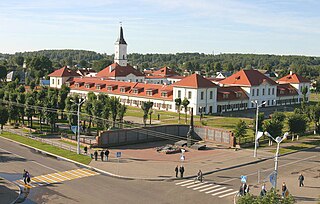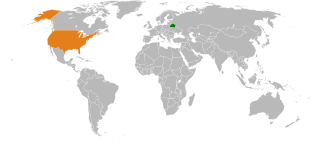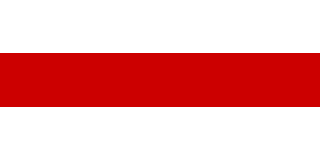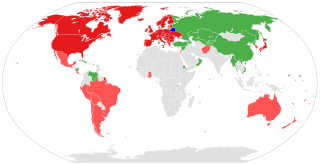Related Research Articles

Belarus, officially the Republic of Belarus, is a landlocked country in Eastern Europe. It is bordered by Russia to the east and northeast, Ukraine to the south, Poland to the west, and Lithuania and Latvia to the northwest. Belarus spans an area of 207,600 square kilometres (80,200 sq mi) with a population of 9.1 million. The country has a hemiboreal climate and is administratively divided into six regions. Minsk is the capital and largest city; it is administered separately as a city with special status.

Alexander Grigoryevich Lukashenko is a Belarusian politician who has been the first and to date, only president of Belarus since the office's establishment in 1994, making him the current longest-serving head of state in Europe.

The national emblem of Belarus features a ribbon in the colors of the national flag, a silhouette of Belarus, wheat ears and a red star. It is sometimes referred to as the coat of arms of Belarus, although in heraldic terms this is inaccurate as the emblem does not respect the rules of conventional heraldry. The emblem is an allusion to one that was used by the Byelorussian SSR, designed by Ivan Dubasov in 1950, with the biggest change being a replacement of the Communist hammer and sickle with a silhouette of Belarus. The Belarusian name is Dziaržaŭny hierb Respubliki Biełaruś, and the name in Russian is Gosudarstvennyĭ gerb Respubliki Belarusʹ.

Shklow is a town in Mogilev Region, Belarus, located 35 kilometres (22 mi) north of Mogilev on the Dnieper River. It serves as the administrative center of Shklow District. It has a railway station on the line between Orsha and Mogilev. In 2009, its population was 16,439. As of 2024, it has a population of 14,870.

The National Olympic Committee of the Republic of Belarus is one of many national Olympic committees that make up the International Olympic Committee (IOC). Created in 1991, the NOC RB, was charged with selecting athletes to represent Belarus in the Summer and Winter Olympic Games, enforcing anti-doping laws and promoting sporting activity inside Belarus. The current president of the NOC RB is Victor Lukashenko, the son of the current President of Belarus, Alexander Lukashenko.

Interstate relations between the United States and Belarus began in 1991 upon the dissolution of the Soviet Union, of which Belarus had been a part. However, the relations have turned negative due to accusations by the United States that Belarus has been violating human rights. Belarus, in turn, has accused the United States of interfering in its internal affairs.

Mutual relations between the Republic of Belarus and the European Union (EU) were initially established after the European Economic Community recognised Belarusian independence in 1991.

Belaya Rus is a Belarusian political party which was initially founded as a public association on 17 November 2007 to support President Alexander Lukashenko.

Belarus and Ukraine both are full members of the Baku Initiative and Central European Initiative. In 2020, during the Belarusian protests against president Lukashenko, the relationship between Ukraine and Belarus began to deteriorate, after the Ukrainian government criticized Belarusian president Alexander Lukashenko. In the waning days of 2021, the relationship between both countries rapidly deteriorated, culminating in a full-scale invasion on 24 February 2022. Belarus has allowed the stationing of Russian troops and equipment in its territory and its use as a springboard for offensives into northern Ukraine but has denied the presence of Belarusian troops in Ukraine. Even though part of the Russian invasion was launched from Belarus, Ukraine did not break off diplomatic relations with Belarus, but remain frozen. In July 2024, Lukashenko described Ukraine as an enemy.

The Republic of Poland and the Republic of Belarus established diplomatic relations on 2 March 1992. Poland was one of the first countries to recognise Belarusian independence. Both countries share a border and have shared histories, for they have been in the Russian Empire and the Polish–Lithuanian Commonwealth. They joined the United Nations together in October 1945 as original members. The two countries are currently engaged in a border crisis.

The Milk War was a trade conflict between Russia and Belarus in June 2009. Russia and Belarus have close relations and the conflict stemmed from Russia allegedly attempting to pay Belarus US$500 million to recognize the independence of Abkhazia and South Ossetia. Russia also expressed its interest in privatizing the Belarusian milk industry. Belarus responded by seeking negotiations with the European Union on certifying Belarusian milk according to EU regulations. Russia then banned the import of dairy products from Belarus, citing alleged health concerns. The trade conflict ended on June 17, 2009, when Russia announced that it would lift the ban.

The Belarusian opposition consists of groups and individuals in Belarus seeking to challenge, from 1988 to 1991, the authorities of Soviet Belarus, and since 1995, the leader of the country Alexander Lukashenko, whom supporters of the movement often consider to be a dictator. Supporters of the movement tend to call for a parliamentary democracy based on a Western model, with freedom of speech and political and religious pluralism.

Belarusian nationalism refers to the belief that Belarusians should constitute an independent nation. Belarusian nationalism began emerging in the mid-19th century, during the January Uprising against the Russian Empire. Belarus first declared independence in 1917 as the Belarusian Democratic Republic, but was subsequently invaded and annexed by the Russian Soviet Federative Socialist Republic in 1918, becoming part of the Soviet Union. Belarusian nationalists both collaborated with and fought against Nazi Germany during World War II, and protested for the independence of Belarus during the late 1980s and early 1990s.

Viktor Aleksandrovich Lukashenko or Viktar Alyaksandravch Lukashenka is a Belarusian politician and the eldest son of Belarusian president Alexander Lukashenko. He currently serves as the president of the Belarus Olympic Committee. Previously, he served as a national security advisor to his father.

The 2020–2021 Belarusian protests were a series of mass political demonstrations and protests against the Belarusian government and President Alexander Lukashenko. The largest anti-government protests in the history of Belarus, the demonstrations began in the lead-up to and during the 2020 presidential election, in which Lukashenko sought his sixth term in office. In response to the demonstrations, a number of relatively small pro-government rallies were held.

Sviatlana Hieorhiyeuna Tsikhanouskaya is a Belarusian political activist. After standing as a candidate in the 2020 presidential election against the president Alexander Lukashenko, she has led the political opposition to his authoritarian rule through an oppositional government operating from Lithuania and Poland.

The following is a list of the official reactions to the 2020 Belarusian presidential election and the surrounding 2020 Belarusian protests.
Dzianis Melyantsou, is a Belarusian political scientist and commentator of foreign relations of Belarus. He is criticised for propaganda in Belarus and lobbyism of the authoritarian regime of Alexander Lukashenko.
The Belarusian partisan movement is an ongoing campaign of resistance against the authoritarian regime of Alexander Lukashenko. It began in response to the violent suppression of the 2020–2021 Belarusian protests. The partisans aim to depose Lukashenko's government and expel Russian troops from Belarus.
References
- ↑ "Kėdainių FK "Nevėžis" ruošiasi artėjančiam sezonui" (in Lithuanian). FK Nevėžis. 16 February 2017. Retrieved 2 March 2017.
- ↑ ""С белорусским менталитетом, немного колхозным, людей нужно держать пожестче". Вратарь из Литвы учит жизни в Беларуси" ["With the slightly kolkhoz-like Belarusian mentality you have to rule the people more harshly": Lithuanian goalkeeper offers life advice in Belarus]. bytribuna.global.ssl.fastly.net (in Russian). 18 January 2021. Retrieved 19 January 2021.
- ↑ "A.Lukašenkos režimą palaikantis S.Skinderis: "Kodėl gyvenu Baltarusijoje, o ne Lietuvoje? Nes čia geriau"" [S. Skinderis, supporter of A. Lukashenko's regime: "Why do I live in Belarus, not Lithuania? Since here it's better"]. sportas.lt (in Lithuanian). 18 January 2021. Retrieved 19 January 2021.
- ↑ "Александр Ивулин: "Надеюсь, что Недосекову через пять лет будет стыдно"" [Alexander Ivulin: "I hope, that Nedosekov will be ashamed after five years"]. bytribuna.global.ssl.fastly.net (in Russian). 19 January 2021. Retrieved 19 January 2021.
